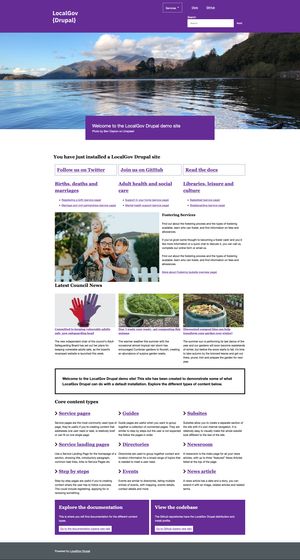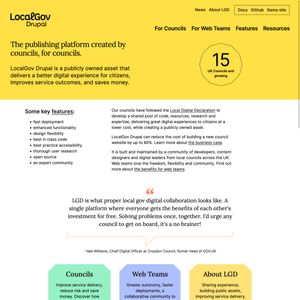Demo content
The LocalGov Demo module is really useful for a number of reasons:
- it provides a quick way for a developer to enable the module and see examples of a variety of content types, referencing each other to demonstrate the information architectures that can be created
- it provides reasonably realistic example content against which to test module and theme development
- it provides a source content for the publicly available demo site.
Creating a good set of example content is time consuming, so we set up a couple of all-hands group sessions on subsequent Fridays where we all jumped on a call and co-created sections of a fictional council's website. Rather than use lorem ipsum, we've copied content from real council websites (with permission!) and replaced any council specific information with sample details. Where we've referred to a council, we've decided to refer to the fictional Scarfolk Council, as a number of people who work for councils find this mildly amusing and it is good to have a 'realistic' fictional council name to work with!
But the hard work does not finish there. We use the default content module to export content as yaml files and import them on install. This is great, but the export misses a number of important aspects, such as menus and circular references where content that is created cannot reference content that has yet to be created, so we need to implement post install hooks to load and save all the nodes of certain types to ensure all the cross linking is maintained. With a repeated testing and various work arounds we got all the content and menu items and important default configuration in place for the end of the sprint.
The LocalGov install profile 2.1.8 now includes the latest LocalGov Demo 2.1.0 release, so a fresh install of the profile with composer should allow developers to test the new demo content locally. Demo content can also be seen on the https://demo.localgovdrupal.org/ site.
Goal! A massive thanks to everyone who helped with this!

New website
In parallel to the awesome work on the demo content module, Sally, Maria, Michael and Tim have been working on the design, build and content for the new localgovdrupal.org site. Code named 'shop window', this is something that has been needed for some time: a website that clearly explains what LocalGov Drupal is, who it is for, what it includes and what value it will bring to councils.
By the time this post is finished, the new site should be live on https://localgovdrupal.org.
The main domain was previously used for the documentation site, which we've now moved to https://docs.localgovdrupal.org.
Both the main site and the docs site are a continuous work in progress, so we welcome any suggestions or contributions on GitHub. For issues or suggestions on the docs site see https://github.com/localgovdrupal/docs/issues, for the main site see https://github.com/localgovdrupal/localgovdrupal.org/issues.

Documentation
The documentation for localgov_directories has been conspicuously absent from the docs site until Agile Collective's James Hall jumped in the sprint and fleshed out the section on https://docs.localgovdrupal.org/content/features/directories.html. There you will now find detailed explanation of the concepts that underpin the content types of 'directory facets', 'directory channels' and 'directory items'. The architecture has grown to give content designers the ability their own categories for facetted filters without needing technical support from developers. This can seem a little idiosyncratic, so it is great to see a 'how to' guide with screen shots to walk people through the process. https://docs.localgovdrupal.org/content/features/directories.html#how-to. Thanks James!
Workflow review dates
And finally, Stephen has finished work on the 'LocalGov review date' sub module, as defined by the content lifecycle working group. This optional module allows a content designer to flag that a piece of content has been reviewed and to set a future date at which it should be reviewed again. At the future date, the 'scheduled transitions' module will create a new revision for review which will be listed in the 'needs review' content listing for appropriate users. The functionality is not yet merged, awaiting code review from other developers, but we expect this to be released soon.
